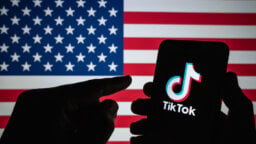TikTok may be embroiled in a dispute with the world’s largest music rightsholder, but that isn’t stopping the platform from pushing further into the world of music.
As of Thursday (February 22), TikTok’s Add To Music App feature will be available in another 163 countries, meaning it will now be available virtually everywhere that TikTok itself is available.
The feature, which allows users to save songs they discover on the platform to the music streaming service of their choice, launched in the US and UK last November. It was expanded to another 19 countries, including Japan, Germany, France, Italy and Canada, in December.
With the ByteDance-owned app’s latest announcement, the feature will be available in 184 of the world’s 195 countries. (Notably absent from the list are Russia, Iran and North Korea; also absent is China, where ByteDance operates TikTok’s sister app, Douyin.)
The feature works within TikTok via a button that says “Add Song” at the bottom of videos in a user’s “For You” feed.
When users click this button, they save the song to a playlist in their preferred music streaming service – including Amazon Music, Apple Music, or Spotify – on their device.
(Songs are saved to a default playlist in these music apps, but TikTok users also have the option of saving them to a new or existing playlist they’ve created. Users can also change the music app to which the songs are saved.)
TikTok users can also use the Add to Music App feature from an artist’s Sound Detail Page.
“With Add to Music App, we are streamlining the music discovery experience for both TikTok users and artists,” Isaac Bess, TikTok’s Global Head of Distribution Partnerships, said in a statement.
“Music fans are embracing the opportunity to save music from TikTok directly to their favorite music streaming services, driving music discovery and helping more tracks to break through and become hits. We are really excited to be bringing the feature to millions more music fans around the world, providing even more opportunities for music discovery and consumption, and for artists to reach new audiences and grow their careers.”
The app also presents TikTok with the opportunity to do some in-depth market research on music streaming usage at a time when it’s rolling out its own music streaming service: TikTok Music.
The premium-only service launched last July in Brazil and Indonesia, with licenses from all three of the music majors (Sony Music, Universal Music Group and Warner Music Group).
“With Add to Music App, we are streamlining the music discovery experience for both TikTok users and artists.”
Isaac Bess, TikTok
Around the same time, TikTok launched the service in beta mode in Australia, Mexico and Singapore. But when it fully launched the service in those markets in October, it did so only with Sony and Warner’s catalogs, and without Universal’s.
That foreshadowed what happened in January, when Universal’s recorded music and publishing catalogs began to disappear from TikTok, as the two companies failed to come to a licensing agreement.
By MBW’s estimate, the disappearance of UMG’s music from TikTok means the music company stands to lose out on around $110 million in revenue on annual basis, but it represents a different kind of problem for the music-driven TikTok platform.
During the first week of February, shortly after UMG tracks were taken off the platform, nearly half of the Top 50 tracks on TikTok were unusable due to the ongoing conflict.
All the same, TikTok’s announcement of the expansion of the Add To Music App shows the company is undeterred in its expanding campaign to capitalize on the popularity and centrality of music on its platform.
In 2022, TikTok launched its own music distribution platform, SoundOn, and in 2023, parent company ByteDance unveiled an AI-driven music-making platform called Ripple. TikTok itself is testing an AI lyric generator called AI Song.
Last year, TikTok launched “Artist Accounts” specifically for musicians on the platform, as well as an emerging artist discovery program called Elevate.
Countries to which TikTok is now bringing its Add To Music App include: Albania, Algeria, Andorra, Angola, Anguilla, Antigua and Barbuda, Armenia, Austria, Azerbaijan, Bahamas, Bahrain, Bangladesh, Barbados, Belarus, Belgium, Belize, Benin, Bermuda, Bhutan, Bolivia, Bosnia and Herzegovina, Botswana, British Virgin Islands, Brunei, Bulgaria, Burkina Faso, Burundi, Cabo Verde, Cambodia, Cameroon, Cayman Islands, Chad, Chile, Comoros, Congo, Democratic Republic of the Congo, Costa Rica, Croatia, Curaçao, Cyprus, Czech Republic, Côte d’Ivoire, Denmark, Djibouti, Dominica, Dominican Republic, Ecuador, Egypt, El Salvador, Equatorial Guinea, Estonia, Eswatini, Ethiopia, Fiji, Finland, Gabon, Gambia, Georgia, Ghana, Greece, Grenada, Guatemala, Guinea, Guinea-Bissau, Guyana, Haiti, Honduras, Hungary, Iceland, Iraq, Israel, Jamaica, Jordan, Kazakhstan, Kenya, Kiribati, Kosovo, Kuwait, Kyrgyzstan, Laos, Latvia, Lebanon, Lesotho, Liberia, Libya, Liechtenstein, Lithuania, Luxembourg, Madagascar, Malawi, Maldives, Mali, Malta, Marshall Islands, Mauritania, Mauritius, Federated States of Micronesia, Moldova, Monaco, Mongolia, Montenegro, Montserrat, Morocco, Mozambique, Myanmar, Namibia, Nauru, Nepal, New Zealand, Nicaragua, Niger, Nigeria, North Macedonia, Norway, Oman, Pakistan, Palau, Palestine, Panama, Papua New Guinea, Paraguay, Peru, Poland, Portugal, Qatar, Romania, Rwanda, Saint Kitts and Nevis, Saint Lucia, Saint Vincent and the Grenadines, Samoa, San Marino, Sao Tome and Principe, Senegal, Serbia, Seychelles, Sierra Leone, Slovakia, Slovenia, Solomon Islands, Sri Lanka, Suriname, Switzerland, Taiwan, Tajikistan, Tanzania, Timor-Leste, Togo, Tonga, Trinidad and Tobago, Tunisia, Turkmenistan, Turks and Caicos Islands, Tuvalu, Uganda, Ukraine, Uruguay, Uzbekistan, Vanuatu, Venezuela, Yemen, Zambia, Zimbabwe.Music Business Worldwide





